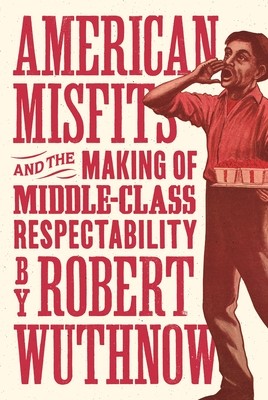
- We will send in 10–14 business days.
- Author: Robert Wuthnow
- Publisher: Princeton University Press
- ISBN-10: 0691210713
- ISBN-13: 9780691210711
- Format: 16.5 x 23.9 x 2.3 cm, minkšti viršeliai
- Language: English
- SAVE -10% with code: EXTRA
American Misfits and the Making of Middle-Class Respectability (e-book) (used book) | bookbook.eu
Reviews
Description
How American respectability has been built by maligning those who don't make the grade
How did Americans come to think of themselves as respectable members of the middle class? Was it just by earning a decent living? Or did it require something more? And if it did, what can we learn that may still apply? The quest for middle-class respectability in nineteenth-century America is usually described as a process of inculcating positive values such as honesty, hard work, independence, and cultural refinement. But clergy, educators, and community leaders also defined respectability negatively, by maligning individuals and groups--"misfits"--who deviated from accepted norms. Robert Wuthnow argues that respectability is constructed by "othering" people who do not fit into easily recognizable, socially approved categories. He demonstrates this through an in-depth examination of a wide variety of individuals and groups that became objects of derision. We meet a disabled Civil War veteran who worked as a huckster on the edges of the frontier, the wife of a lunatic who raised her family while her husband was institutionalized, an immigrant religious community accused of sedition, and a wealthy scion charged with profiteering. Unlike respected Americans who marched confidently toward worldly and heavenly success, such misfits were usually ignored in paeans about the nation. But they played an important part in the cultural work that made America, and their story is essential for understanding the "othering" that remains so much a part of American culture and politics today.EXTRA 10 % discount with code: EXTRA
The promotion ends in 23d.02:49:25
The discount code is valid when purchasing from 10 €. Discounts do not stack.
- Author: Robert Wuthnow
- Publisher: Princeton University Press
- ISBN-10: 0691210713
- ISBN-13: 9780691210711
- Format: 16.5 x 23.9 x 2.3 cm, minkšti viršeliai
- Language: English English
How American respectability has been built by maligning those who don't make the grade
How did Americans come to think of themselves as respectable members of the middle class? Was it just by earning a decent living? Or did it require something more? And if it did, what can we learn that may still apply? The quest for middle-class respectability in nineteenth-century America is usually described as a process of inculcating positive values such as honesty, hard work, independence, and cultural refinement. But clergy, educators, and community leaders also defined respectability negatively, by maligning individuals and groups--"misfits"--who deviated from accepted norms. Robert Wuthnow argues that respectability is constructed by "othering" people who do not fit into easily recognizable, socially approved categories. He demonstrates this through an in-depth examination of a wide variety of individuals and groups that became objects of derision. We meet a disabled Civil War veteran who worked as a huckster on the edges of the frontier, the wife of a lunatic who raised her family while her husband was institutionalized, an immigrant religious community accused of sedition, and a wealthy scion charged with profiteering. Unlike respected Americans who marched confidently toward worldly and heavenly success, such misfits were usually ignored in paeans about the nation. But they played an important part in the cultural work that made America, and their story is essential for understanding the "othering" that remains so much a part of American culture and politics today.

Reviews